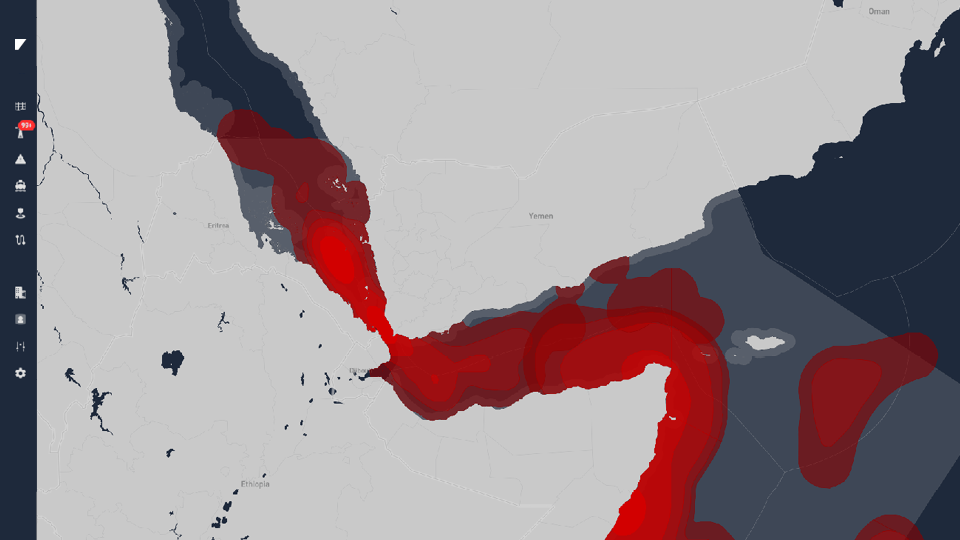AMBREY THREAT CIRCULAR > RED SEA CRISIS

This document has been approved for distribution by Ambrey Analytics Ltd.
A. EXECUTIVE SUMMARY
- Ambrey assesses Israel-affiliated vessels to remain at high risk.
- Ambrey assesses a realistic possibility that US, UK, and allied-affiliated vessels may face heightened risk during transit if their states participate in military action against the Houthis or Iran.
- Other merchant shipping is assessed to be at a low risk.
- The last attempted Houthi attack against a merchant vessel occurred on 26 Dec 2024.

B. SITUATION
| Key dates | Description |
| 26 December 2024 | Last Houthi targeting of a merchant vessel |
| 19 January 2025 | Israel-Hamas ceasefire, Houthis announced they would stop “banning” all but vessels wholly owned by Israelis and/or sailing Israeli flag |
| 12 March 2025 | Houthis threatened to target “any Israeli vessel” over the flow of humanitarian aid to Gaza |
| 15 March 2025 | US resumed military strikes in Yemen |
| 18 March 2025 | Israel resumed the conflict in Gaza |
| 29 April 2025 | UK resumed direct military strikes in Yemen, none reported since |
| 06 May 2025 | US-Houthi agreement brokered by Oman |
| 19 May 2025 | Houthi announce ‘blockade’ against Haifa, Israel |
TRANSIT EVIDENCE
| Transits through the southern Red Sea or western Gulf of Aden | Date since | Description – based on sources known to be used by the Houthis |
| US merchant ships | 6 May 25 | One bulk carrier whose group owner was listed on the NASDAQ |
| UK merchant ships | 6 May 25 | Two UK-flagged bulk carriers |
| Companies that have called Haifa, Israel | 19 May 25 | Charterer yes, owner no |
| Companies that have called other Israeli ports | 19 May 25 | Charterer yes, owner no |
| Israeli-owned or -flagged ships | 19 Jan 25 | No |
The Houthis have not claimed an attack against a merchant vessel since December 2024. Since then, the Houthis have targeted US Navy vessels and Israel. During the Israel-Hamas ceasefire between January 2025 and March 2025, the Houthis did not conduct military operations. Since an agreement between the US and the Houthis, there have been no US airstrikes against Houthi-held positions and no attacks against US Navy vessels. The US Navy’s TRUMAN Carrier Strike Group departed the Red Sea homebound after the military engagement ended. During this time, no US-flagged vessel transited the Bab el-Mandeb. The UK participated in airstrikes against the Houthis, though only in cooperation with the US. Since the US-Houthis agreement, the UK Carrier Strike Group around HMS PRINCE OF WALES transited the Bab el-Mandeb Strait without an incident. UK-flagged vessels have also transited unhindered. The Houthis have maintained threats against Israel-owned and -flagged vessels. In response to further escalations, the Houthis declared a ‘blockade’ against the Israeli port of Haifa.
C. THREAT UPDATE
The absence of attacks against shipping is assessed to primarily be related to the reality that no Israel-owned or -flagged vessels transit the area. Ambrey assesses UK and US affiliated shipping to be at reduced risk, provided neither participates in military strikes on the Houthis or Iran. The Houthis continue to launch missiles and unmanned aerial vehicles toward Israel. These attacks have led to reciprocal Israeli airstrikes against Houthi-held territory such as the ports of Hodeidah and Ras Issa. Due to the active and ongoing Israel-Hamas and Israel-Iran conflicts, the Houthi threat to Israeli shipping is assessed to remain elevated. Merchant shipping in Houthi-controlled ports may experience collateral damage during airstrikes. Israeli military strikes against Iran have made a resumption of targeting US and UK assets in the Red Sea a higher likelihood, and a realistic possibility within a timeframe of a transit. This means that the risk could significantly deteriorate whilst enroute. This is because the US is almost certainly preparing military options for strikes on Iran. Israeli strikes have not degraded all nuclear sites, and American support would likely be required. The UK has also positioned military assets in support of allies. Therefore, involvement in the Israel-Iran conflict cannot be ruled out. Offensive military operations against Iran are assessed to increase the risk to related shipping in the Red Sea as it is probable the Houthis would resume operations against US assets in support of Iran.
D. MITIGATION
- Affiliation checks against the Houthi target profile to understand the perceived affiliations of your fleet/vessel: Ambrey recommends a thorough affiliation check as part of a transit risk assessment is performed for Red Sea and Gulf of Aden voyages. Ambrey continues to adjust these as per the developing intent and threat.
- Avoid transiting the southern Red Sea, Bab al Mandeb and Gulf of Aden if there is an affiliation with Israel. Limit aggregate risk exposure if there is an affiliation with the US, UK, or another country that may participate in military strikes on Iran.
- Shipping with a European Union (EU) affiliation is advised to engage with EU NAVFOR Operation ASPIDES. An EU flag, ownership, cargo, operator, or insurance is likely to be considered an EU affiliation. Ambrey advises that where there is a realistic possibility of targeting, close protection services should be requested.
- Merchant shipping assessed to be at heightened risk is advised to carry out Ship Security Assessments tailored to the threat, and to implement recommended and proportionate ship protection measures, including Private Armed Security Teams, before sailing.
- Bridge support: Unarmed advisors to prepare and reassure crew and assist with military liaison. Digital operations can also support with route planning, voyage preparation, and keep the bridge and shore staff informed of any changes in risk while enroute.
CONTACT INFORMATION
Ambrey: +44 203 503 0320 – intelligence@ambrey.com
AMBREY – For Every Seafarer, Every Vessel, Everywhere.
END OF DOCUMENT